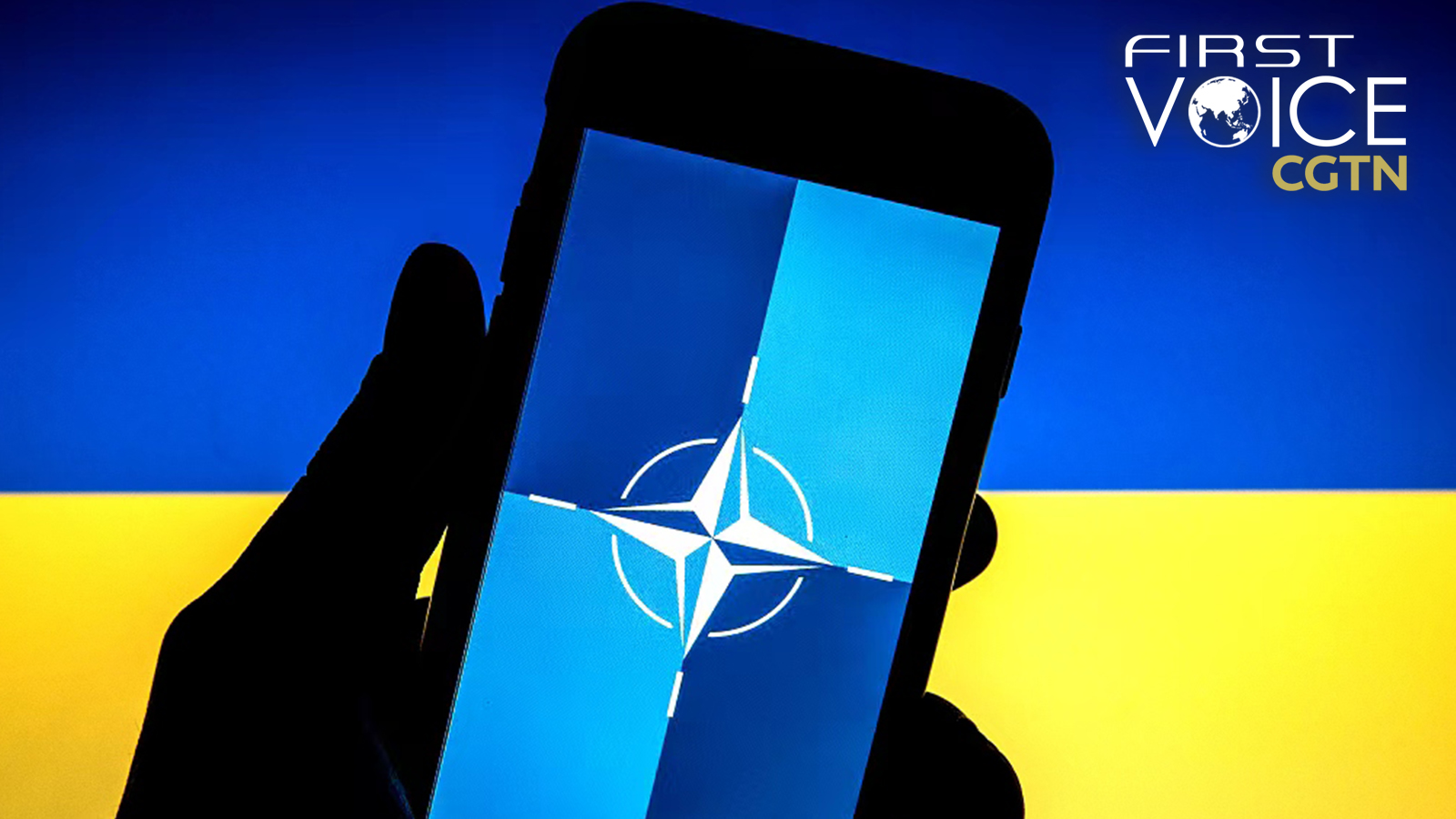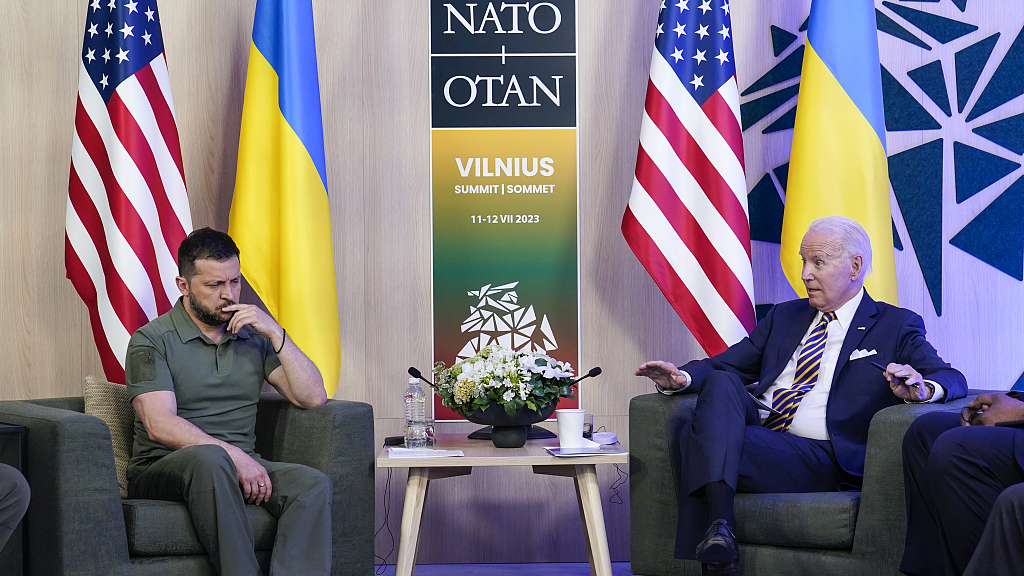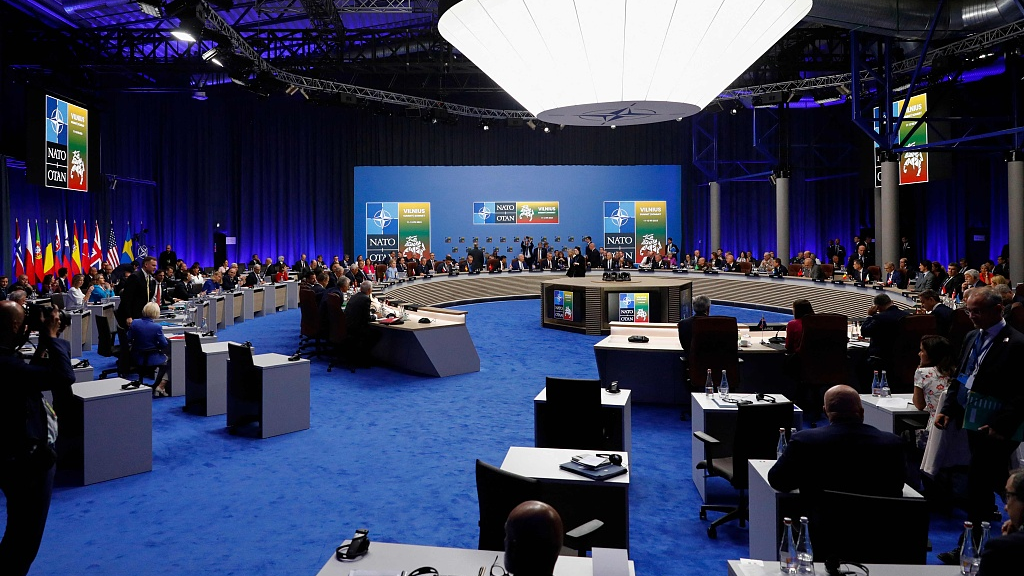
Editor's note: CGTN's First Voice provides instant commentary on breaking stories. The column clarifies emerging issues and better defines the news agenda, offering a Chinese perspective on the latest global events.
The two-day NATO summit, which ended in Vilnius, the capital of Lithuania, on July 12, was intended to show the world the unity of the Atlantic region, but it turns out that the much-touted "NATO unity" seems more like fantasy than reality. As CGTN special commentator William Jones, a former White House correspondent for Executive Intelligence Review put it, the unity claimed by NATO may be a mile-wide, but it is only an inch deep.
A key topic of the summit is the aid plan for Ukraine and its prospect of joining NATO. However, the summit communique didn't invite Ukraine to join the alliance, nor did it give a timetable for it.
The bloc faces differences over the war-torn country's membership, which has been opposed by the U.S., Germany, and Hungary although supported by Poland and the Baltic countries.
"I don't think there is unanimity in NATO about whether or not to bring Ukraine into the NATO family now, at this moment, in the middle of a war," President Joe Biden told CNN in an interview, warning that NATO's Article 5 on collective defense stipulates that an armed attack on a member country shall be considered an attack on all the members, which requires them to jointly defend the country under attack.
Accordingly, if Ukraine joins the bloc amid the war, this would immediately commit all the NATO countries to jointly defending their new partner. Such a decision is not a simple yes or no question for the member states, so differences are inevitable.

U.S. President Joe Biden speaks during a meeting with Ukraine's President Volodymyr Zelenskyy on the sidelines of the NATO summit in Vilnius, Lithuania, July 12, 2023. /CFP
U.S. President Joe Biden speaks during a meeting with Ukraine's President Volodymyr Zelenskyy on the sidelines of the NATO summit in Vilnius, Lithuania, July 12, 2023. /CFP
"NATO Asia-Pacificization" is another issue where the Vilnius summit failed to reach an agreement. Not only did the meeting invite Asia-Pacific countries such as Japan and South Korea to participate but China was mentioned dozens of times in the summit communique, which stated that the Asian emerging country's "stated ambitions and coercive policies challenge our interests, security and values," and pose a "systemic challenge" to the security of the Euro-Atlantic region.
However, NATO's eastward movement has not received the support of some member states. On July 12, French President Emmanuel Macron informed NATO chief Jens Stoltenberg of his opposition to plans to open a liaison office in Tokyo, Japan. To put it simply, NATO means North Atlantic Treaty Organization, but "the Indo-Pacific is not the North Atlantic," said Macron.
Former Australian Prime Minister Paul Keating, who agreed with Macron, believed that all parties concerned should always remember NATO's "North Atlantic" geographic scope. Keating pointed out that Europeans have been fighting each other for most of the past 300 years, bringing about two world wars in the past 100 years. Now, NATO wants to export this malicious poison to Asia again, just like letting Asia welcome the plague.
Most European countries prefer to avoid conflicts in Asia-Pacific, which will affect their trade relations with China. Hence, the U.S. and Japan's attempts to draw NATO into playing the "Asia-Pacific card" to stimulate their competition with China aren't in line with the interests of most Europeans. That's why we didn't see any provision about the establishment of the Tokyo liaison office in the Vilnius summit communique although there had been so much hype about it before.

Participants attend the NATO summit in Vilnius, Lithuania, July 11, 2023. /CFP
Participants attend the NATO summit in Vilnius, Lithuania, July 11, 2023. /CFP
U.S. President Joe Biden once said that "NATO has never, never been more united than it is today." But behind the guise of transatlantic unity lie the deep-seated contradictions among NATO members, who are acting like "vassals of the U.S., as opposed to independent powers" after World War II, said Benjamin Abelow, the author of "How the West Brought War to Ukraine: Understanding How U.S. and NATO Policies Led to Crisis, War, and the Risk of Nuclear Catastrophe," during an interview with CGTN's First Voice.
As a vassal, if you always go against the trend, do things that threaten peace, and become a "war machine" driven by major powers, NATO's "unity" may always be an illusion.
(If you want to contribute and have specific expertise, please contact us at opinions@cgtn.com. Follow @thouse_opinions on Twitter to discover the latest commentaries in the CGTN Opinion Section.)